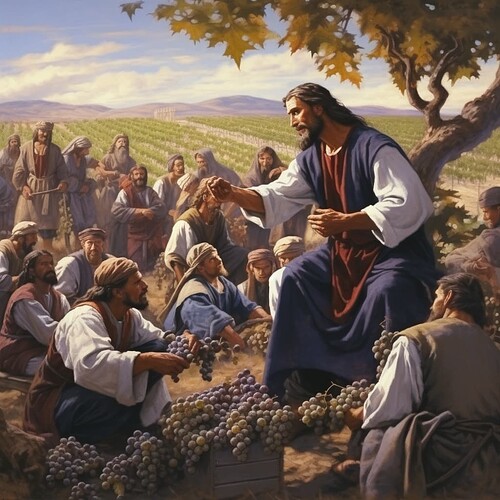Understanding the Generosity of God’s Kingdom
 Introduction
Introduction
On January 18th, we explore Matthew 20, a chapter rich with Jesus’ teachings on the nature of God’s kingdom and grace. This chapter includes the Parable of the Workers in the Vineyard, illustrating the generosity of God’s kingdom.
 Matthew 20: The Parable of the Workers in the Vineyard
Matthew 20: The Parable of the Workers in the Vineyard
Matthew 20 opens with Jesus narrating the Parable of the Workers in the Vineyard, where workers hired at different times receive the same wage. This parable challenges conventional notions of fairness, emphasizing God’s grace and generosity.
Key Verse: “So the last will be first, and the first will be last.” — Matthew 20:16
 Key Themes and Reflections:
Key Themes and Reflections:
Generosity of God’s Kingdom: The parable illustrates the inclusive and generous nature of God’s kingdom, where grace, not merit, determines one’s reward.
Challenging Human Perspectives: Jesus’ teaching confronts our human ideas of fairness and entitlement, urging us to adopt a kingdom perspective.
Service and Sacrifice: The chapter also discusses service and sacrifice in God’s kingdom, emphasizing humility and selflessness as key virtues.
 Today’s Application:
Today’s Application:
Reflect on your understanding of fairness and how it aligns with the principles of God’s kingdom. Consider the implications of God’s grace in your life and how it should influence your interactions with others.
 Hidden Gem:
Hidden Gem:
Did you know? The mother of James and John requests positions of honor for them (Matthew 20:20-28), leading Jesus to teach about true greatness through service and humility.
 Reflective Q&A:
Reflective Q&A:
![]() Matthew 20: Parables and Teachings
Matthew 20: Parables and Teachings
![]() Understanding God’s Generosity: How does the Parable of the Workers in the Vineyard reshape our understanding of God’s grace and generosity?
Understanding God’s Generosity: How does the Parable of the Workers in the Vineyard reshape our understanding of God’s grace and generosity?
A: This parable challenges us to embrace God’s grace, which often defies human notions of fairness, reminding us that God’s ways are higher than our ways.
![]() The Call to Humble Service: What does Jesus’ teaching about greatness in the kingdom of God tell us about the values we should cherish?
The Call to Humble Service: What does Jesus’ teaching about greatness in the kingdom of God tell us about the values we should cherish?
A: Jesus’ teaching emphasizes humility and serving others as the path to true greatness, contrasting worldly aspirations for power and prestige with the kingdom’s values of selflessness and servant leadership.
 Join the Discussion:
Join the Discussion:
How does Matthew 20 impact your perspective on grace, fairness, and service? Share how these teachings influence your spiritual walk and interactions with others.
#Matthew20 #ParableOfVineyard #KingdomOfGod #Grace #BibleStudy #SpiritualJourney
![]() Anticipate Tomorrow’s Teachings: Join us as we continue to delve into the teachings of Jesus and discover the profound truths of the kingdom of God.
Anticipate Tomorrow’s Teachings: Join us as we continue to delve into the teachings of Jesus and discover the profound truths of the kingdom of God.
 Join the forum!
Join the forum!
Grow in your spiritual journey with the AIgniteScripture Community:
Free Members: Participate in discussions and access biblical resources. Join here: 🌟 How to Join Page - Membership Options
Supporters Membership ($20/month or $200/year): Enjoy personalized newsletters, exclusive forum access, and deeper insights. Become a Supporter: 🌟 How to Join Page - Membership Options
![]() Stay Informed with our AIgniteScripture Newsletter: Follow our daily readings and insights. Subscribe here: https://newsletter.aignitescripture.com/
Stay Informed with our AIgniteScripture Newsletter: Follow our daily readings and insights. Subscribe here: https://newsletter.aignitescripture.com/
